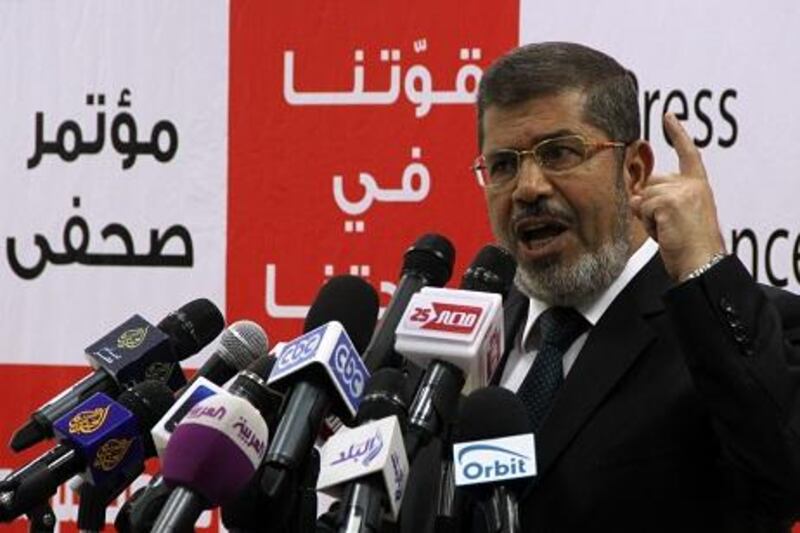CAIRO // Fresh turmoil threatened Egypt's political transition yesterday after the country's constitutional court invalidated the results of one-third of the races in recent parliamentary elections that were dominated by Islamist parties.
The court also ruled as unconstitutional a law that would have barred Ahmed Shafiq, Hosni Mubarak's last prime minister, from standing in a presidential elections set to begin tomorrow.
Under yesterday's ruling, the court nullified those parliamentary contests in which candidates affiliated with political parties ran as independents. The court said those seats had been designated for independent candidates and those races must be held again with candidates who are legitimately independents.
The decision by the Supreme Constitutional Court (SSC), which is made up of Mubarak appointees, could end the Islamists' domination of parliament and further delay the selection of a panel to write a new constitution for the country.
Mohammed Morsi, the Muslim Brotherhood’s candidate, said last night that he respected the rulings of Egypt’s top court. “I respect the decision of the Supreme Constitutional Court in that I respect the institutions of the state and the principle of separation of powers,”
Mr Morsi told the Dream private satellite channel, adding “this ruling does not dissolve parliament”.
He said he also respected the decision to allow Mr Shafiq to stay in the race but he said the ruling was “unsatisfactory”.
There were claims across the political sphere and on social-networking sites that the court's twin decisions yesterday amounted to a "coup" by members of the old regime of Mubarak.
"Keeping the military candidate [in the race] and overturning the elected parliament after granting the military police the right to arrest is a complete coup and whoever thinks that millions of youth will let it pass is deluding themselves," said Abdel Moneim Abol Fotouh, the self-styled moderate Islamist on his Facebook page.
By yesterday evening, there were only scattered protests across Cairo, but political parties were holding meetings into the night to determine their course of action.
Mr Shafiq, who is seen by many as a Mubarak loyalist and a vote for the continuation of the old regime, welcomed the "historic" decision to allow him to stay in the presidential race against Mr Morsi. They are competing to succeed Mubarak, 84, who was in a stable condition in a prison hospital yesterday after his health reportedly took a sharp turn for the worse earlier this week.
"The message of this historic verdict is that the era of political score settling has ended," Mr Shafiq told supporters during an appearance in Cairo. "The constitutional court has confirmed my right to participate in the election and reinforced the legitimacy of this election."
It was not yet clear how the Supreme Council of the Armed Forces (Scaf), the group of generals in charge of the country since Mubarak stepped down last year, would choose to implement the constitutional court's decision to invalidate some of the elections results.
Scaf is the acting executive branch of the country and it is left to them to decide whether to redo one third of the elections or hold new voting for the entire parliament. The SCC said in its ruling, that "the make-up of the entire chamber is illegal and, consequently, it does not legally stand", according to the state news agency.
"If you take these decisions coming right before the elections, the surge in support for Shafiq and the resurrection of state media that seems to be following the old patterns of scaremongering, it will look to many people like a counter-revolution," said Nathan Brown, a professor at Georgetown University and expert on Egyptian constitutional law.
The possibility of the complete dissolution of parliament has upended the Egyptian democratic transition and pushed the country on a new, uncertain path. It also threatened the dominance of Islamist political groups that had become increasingly powerful after their success in parliamentary elections.
The Muslim Brotherhood's Freedom and Justice Party won nearly 50 per cent of the seats, while the more conservative, Salafist Al Nour Party won about 25 per cent in elections that started in November and continued through February.
The SCC ruled that an amendment by Scaf before the elections last year violated principles of equal opportunity. Under pressure from a wide range of political groups, Scaf had allowed political party members to run for seats allocated for independents. The Freedom and Justice and Al Nour parties won 84 per cent of the independent seats.
Adding to the conspiratorial sentiments across Egypt was the implementation of a new law on Wednesday that re-established wide powers for the military and intelligence agencies to arrest citizens. The new law came just two weeks after the expiration of the reviled emergency law, which was used for nearly 30 years to arrest and detain citizens without due process.
Mazen Hassan, a professor at Cairo University studying Egypt's political transition, said that the practical consequence of redoing some or all of the parliamentary elections would be that more truly independent candidates would win seats.
"This would surely increase the fragmentation of the People's Assembly, preventing groups from having a working majority and they would have a harder time passing bills," he said.
It was also unclear how the ruling would affect the newly established constitutional commission that was set to begin rewriting Egypt's 1971 constitution. When the SCC dissolved parliament in 1987 and 1990, it also ruled that laws passed up to the court's ruling were legal and upheld.
Mohamed ElBaradei, the Nobel laureate who was a contender for the presidency before bowing out in January, called on the military to delay presidential elections and establish a presidential council to steer the country's transition back on track.
Addressing Scaf, he wrote: "I urge you to postpone the elections and consult all of us on how best to deliver our country to safety."
* With reporting by Reuters and Associated Press






